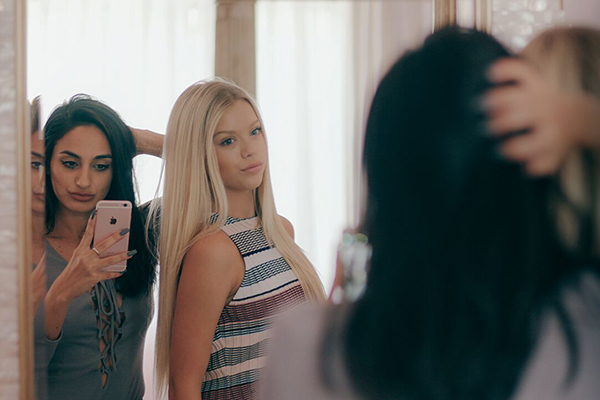Not that long ago I was young and hip. I knew about the latest trends, the latest songs, the latest gadgets. It was my life.
But the process of growing older and having children changed that. My interests and hobbies also evolved.
Thus when my 10-year-old and 7-year-old sons came home a year ago and began doing “Fortnite” dances, I asked what any middle-aged man would ask: What’s Fortnite? Google took care of that.
I had a similar reaction recently when I watched a new documentary, “Social Animals.” It follows three real-world young people as they post nearly everything about their lives on Instagram.
Yes, I know about Instagram. Yes, I even have a mostly ignored Instagram account. But I didn’t fully grasp the negative impact it is having on young people today.
The 87-minute film — which is streaming on all major platforms — is an eye-opener for parents raising children in a selfie-obsessed culture.
Launched in 2010, Instagram is the preferred social media platform for today’s teens. Unlike Facebook and Twitter, which are text-heavy, Instagram is image-driven. The user takes a picture and posts it. A written message is optional. The goal is to get the most “likes.”
“Social Animals” tells the story of Kaylyn, a high schooler who is hyper-obsessed with her looks and has half-a-million followers; Emma, a teenager who had to change high schools because she was bullied on Instagram; and Humza, a New York City photographer who illegally scales tall buildings and bridges to capture the perfect, like-worthy Instagram shot.
Their stories are told without narration or commentary, but that’s not needed. By the time the credits roll you’re convinced that Instagram — without strict boundaries — is bad for a young person’s mental and social health.
Inner beauty
Girls primp and pose for the picture-perfect, model-like shot.
“I look awful!” one says to the other while deleting the “bad” pictures.
In between the stories of Kaylyn, Emma and Humza, we hear from other teens who use Instagram.
“I took a shower, I blow dried my hair, I curled my hair, I did my makeup and it took about an hour and a half just to get ready for a selfie,” one of the girls says.
Another girl uses a special app to erase acne in her pictures.
It’s a world where inner beauty means nothing and looks are everything. It’s a world where “likes” and “followers” determine one’s meaning in life.
Scripture tells us that “charm is deceptive,” “beauty does not last” and each person is “wonderfully made” (Prov. 31:30, Ps. 139:14). But you wouldn’t know that by scrolling Instagram.
“Social Animals” was directed by Jonathan Ignatius Green, who said some parents even watch it with their teens.
“I think our biggest goal is to stir a rich conversation,” Green told me. “[Social media] is powerful. It impacts our entire world —- not just teenagers, but adults, too. Hopefully the takeaway is, ‘Hey, I need to take a look at this and maybe reflect on my own behaviors on social media and my own motivations for doing some of these things.’”
“Social Animals” does includes some rough content, so it’s probably not for everybody.
But its core message — and its implicit warnings — should be heard by today’s families.
Content warning: Social Animals is unrated; treat it like a PG-13-type film. It includes no nudity but does show girls in swimsuits. It also has some coarse language, including some strong language. For more information, Visit SocialAnimalsFilm.com.
EDITOR’S NOTE – Kutter Callaway, assistant professor of culture and theology at Fuller Seminary, wrote a discussion guide. Download it from socialanimalsfilm.com.
Michael Foust covers the intersection of faith and entertainment as a media reviewer for The Alabama Baptist. He also is the husband of an amazing wife and the father of four young children.






Share with others: